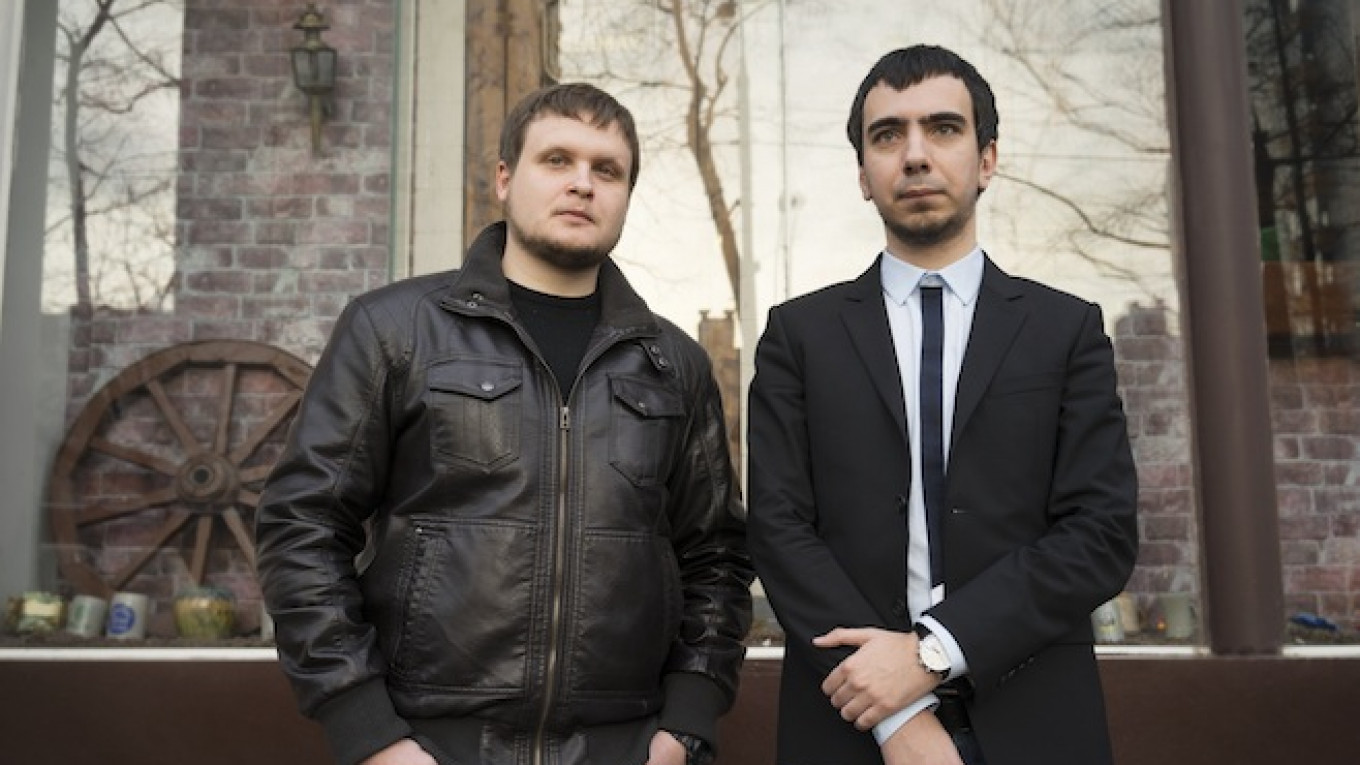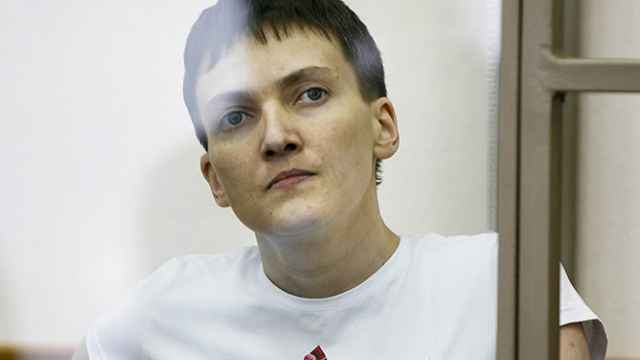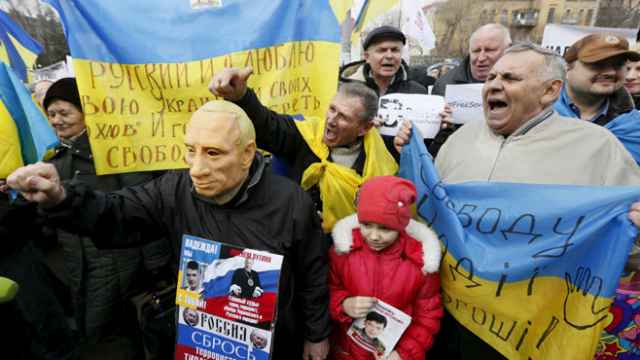The two young men are clearly enjoying their moment. “It's BBC calling, Vova, answer it,” says Alexei Stolyarov, aka “Lexus.” He passes his cell phone to Vladimir Kuznetsov, aka “Vovan,” who takes the call with a smile on his face — “Yes, how about we prank someone from Europe next? Or Obama.” Kuznetsov gestures to two Italian correspondents from La Repubblica newspaper to wait at the next table for their turn to get the story.
Prankster duo Kuznetsov and Stolyarov made international news last week when they sent a fake letter from Ukrainian President Petro Poroshenko to Nadezhda Savchenko, the Ukrainian officer controversially being tried for murder in Russia. Savchenko was five days into a dry hunger strike, but the letter, written supposedly from the Ukrainian supreme commander, urged her to stop.
Savchenko ended her hunger strike, but her lawyers later discovered Poroshenko had never, in fact, written such a letter. The pranksters confessed, provoking outrage from the lawyers.
The stunt was but the latest of a series of high-profile pranks. In September, they tricked singer Elton John into believing he was talking to Putin. Then, they spoke to Poroshenko “on behalf of” the Russian ambassador to Ukraine. And then they claimed to have spoken to Turkish President Recep Erdogan, pretending to be Poroshenko.
Even though the duo were quick to claim responsibility on all three occasions, Russian security services made no intervention. This relaxed approach has led some to suggest they were working under arrangement by the Kremlin.
The pranksters deny it, and say their careers are exclusively media in nature. “We are now on staff at a major national television channel,” Kuznetsov says, before revealing they are launching their own television show in April. He refused to specify which channel was hiring them, though it might be useful to note that the duo frequently turn up for state-run, pro-Kremlin channels Channel 1, Rossia, NTV and RT, among others.
President on Call
Kuznetsov, a 30-year-old lawyer, and Stolyarov, a 28-year-old economist, say they began making prank calls over a decade ago. In the early days, they would call Russian celebrities such as actor Mikhail Boyarsky or flamboyant crooner Boris Moiseyev, “just for the fun of it.”
Kuznetsov eventually got a job at a tabloid magazine. His prank-calling helped him get exclusive information from celebrities, but he quit after three years. “I got tired of the show-business stuff. Same faces, same scandals, same dirt,” he says.
The two have been working together since 2014, and they quickly got involved in politics — “it’s more important to know the truth about politicians these days then anyone else.”
Kuznetsov and Stolyarov proudly admit that they have four presidents in their “collection.” In addition to Poroshenko and Erdogan, they say they have fooled both Moldovan President Nicolae Timofti, pretending to be former Georgian President Mikheil Saakashvili, and Belorussian leader Alexander Lukashenko, pretending to be the son of former Ukrainian President Viktor Yanukovych. Lukashenko was, apparently, ready to provide asylum to the disgraced Yanukovych.
Experts and officials say it is not easy to call a president, but the pranksters disagree. “Not all presidents have secure phone lines, and we often get help from their assistants and aides,” Kuznetsov says. “Timofti uses a regular cell phone for example, and we got the number from his spokesman.”
The pranksters say that “many people” offer money for their services to settle political scores, but they “always refuse on principle.” At the same time, there are plenty of other earning opportunities: “We can sell a recording to a media outlet, or go on a talk show for a fee, though the income is not regular.”
Suspicions Mount
Easy access to presidents and the obviously pro-Kremlin nature of their stunts have prompted much speculation that Kuznetsov and Stolyarov are, in fact, Kremlin stooges under instruction.
If true, such an arrangement would fall into a trend of Russian authorities using different trolling techniques to undermine opponents. Right after the mass protest rallies in 2011, journalists and activists noticed a growing number of pro-Kremlin commentators posting similar or identical comments — they became known as “Kremlinbots.” In June 2015, The New York Times found a large organization in St. Petersburg that was employing dozens of these commentators.
Mark Feygin, the lawyer caught out by the fake Poroshenko letter, has publicly said that the pranksters were operating as part of a special operation launched by Russian law enforcement. “There is nothing to discuss. It is clear where they got the phone numbers and who's behind them,” Feygin told The Moscow Times. He says the aim was to discredit Savchenko and her defense team; in the latter, they certainly succeeded.
Vovan and Lexus deny working for the Kremlin, but their arguments seem strange. “If we worked with the FSB, we would have spent months on approving the plan about Savchenko, and she would have been out by then,” Kuznetsov said.
On March 12, Feygin promised to file a formal complaint to the Prosecutor General's Office. “They forged a state document. It's a huge deal,” he told The Moscow Times. Kuznetsov and Stolyarov responded almost immediately, saying they had a lawyer of their own to protect their interests.
In the meantime, Kuznetsov and Stolyarov say they plan to continue playing tricks on politicians. One man, however, is off limits. The pranksters have a firm, pro-Kremlin position, they say, and they “respect the president.”
“We’d like to meet Putin if anything,” says Kuznetsov. “We don’t want to be a weapon in the hands of Russia’s enemies.”
But are they fine with being a weapon in the hands of the Kremlin?
“Why not, if it’s in line with what we feel,” Kuznetsov says.
Contact the author at [email protected]. Follow the author on Twitter at @dashalitvinovv
A Message from The Moscow Times:
Dear readers,
We are facing unprecedented challenges. Russia's Prosecutor General's Office has designated The Moscow Times as an "undesirable" organization, criminalizing our work and putting our staff at risk of prosecution. This follows our earlier unjust labeling as a "foreign agent."
These actions are direct attempts to silence independent journalism in Russia. The authorities claim our work "discredits the decisions of the Russian leadership." We see things differently: we strive to provide accurate, unbiased reporting on Russia.
We, the journalists of The Moscow Times, refuse to be silenced. But to continue our work, we need your help.
Your support, no matter how small, makes a world of difference. If you can, please support us monthly starting from just $2. It's quick to set up, and every contribution makes a significant impact.
By supporting The Moscow Times, you're defending open, independent journalism in the face of repression. Thank you for standing with us.
Remind me later.






